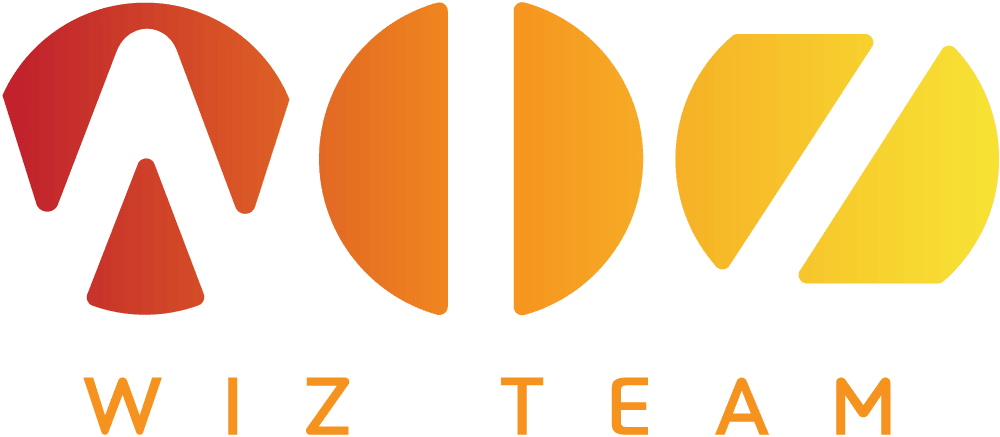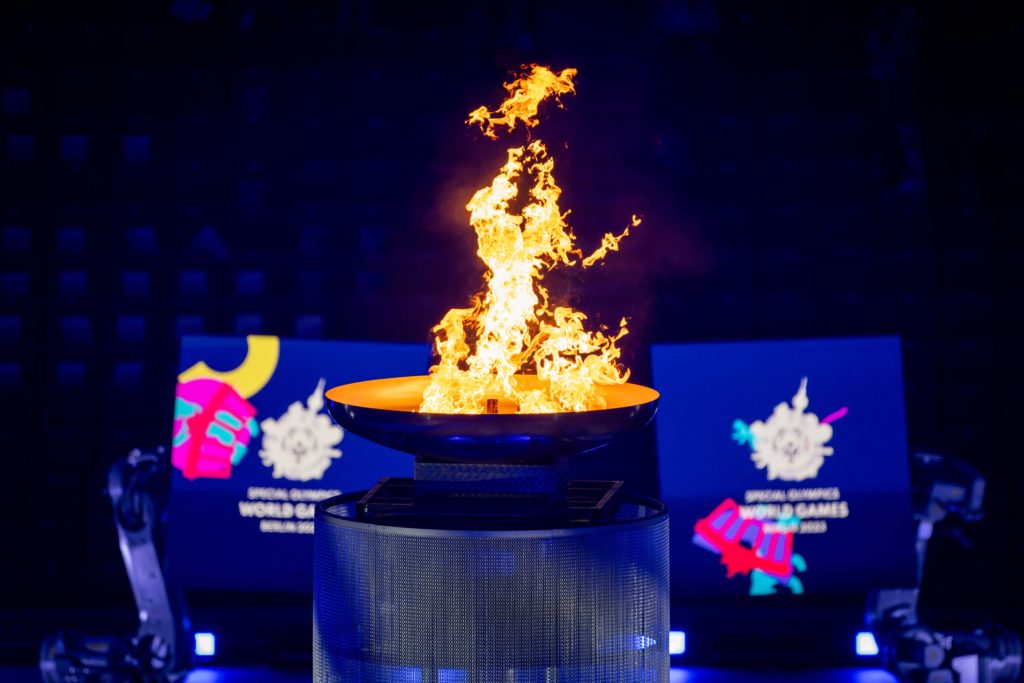Planning a memorable event, be it a corporate conference, a charity gala, or a product launch, can be tedious. Event planning is a high-stakes balancing act, where every detail matters and the pressure to deliver a flawless experience never lets up.
Coordinating so many moving parts can sometimes feel overwhelming. Even the most experienced event organizers can struggle with tight deadlines, limited resources, or unexpected challenges.
But what if you could confidently manage these hurdles and even enjoy the process? This guide is designed for event professionals and organizations worldwide who want to elevate their event planning game, no matter the scale.
This blog will walk you through the essential steps for event planning, insider tips, and proven strategies to turn your next event from stressful to standout. Ready to make your event unforgettable? Keep reading.
How to plan an event: from concept to post-event review
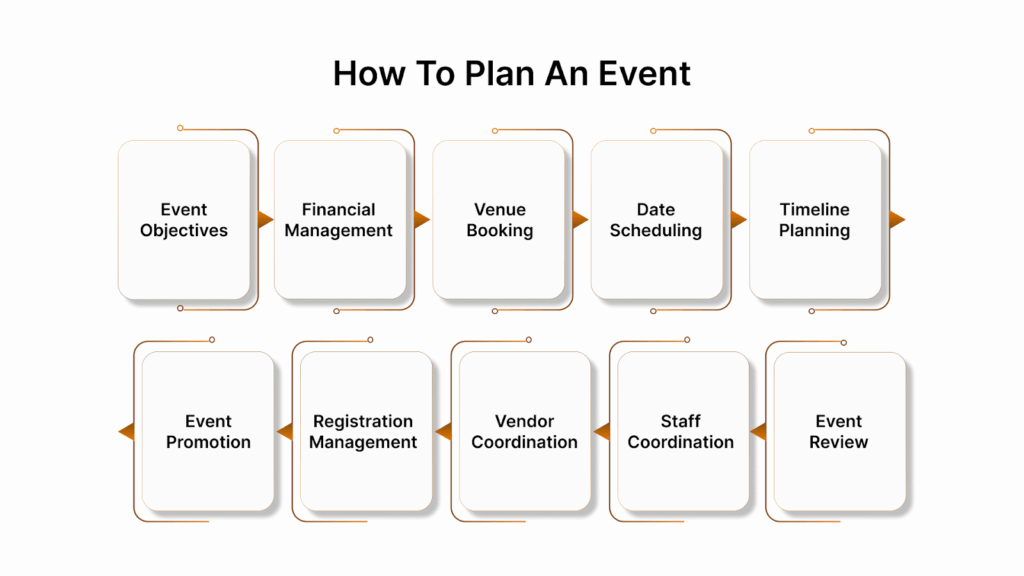
Planning an event is a multifaceted process that requires careful attention to detail at every stage. From defining your goals to managing logistics, securing speakers, promoting the event, and evaluating its success afterwards, each step plays a crucial role in delivering a seamless experience.
The primary steps include:
- Defining your event’s purpose and goals
- Budgeting and financial planning
- Venue selection and booking
- Event date and time selection
- Creating an event timeline
- Promoting and marketing the event
- Managing event registration
- Securing speakers, entertainment & vendors
- Managing staffing and volunteers
- Post-event evaluation & follow-up
Let’s now explore each of these steps in detail, starting with defining your event’s purpose and goals.
1. Defining your event’s purpose and goals

Defining the purpose and goals of your event is the foundation of your entire planning process. Without clear objectives, it’s difficult to measure success or even know what steps to take next.
Step 1: Identify the purpose of your event
Event planning starts with defining the purpose. It could involve building cooperation in a sports tournament, celebrating diversity in a cultural festival, launching a product at a corporate conference, or raising awareness at a fundraiser. Regardless of the event, its core intention shapes every decision.
Clearly defining the “why” ensures decisions on venue, format, marketing, and guest lists align with your vision.
Step 2: Set clear, measurable goals
Now that you’ve identified the event’s purpose, it’s time to define your goals. The best goals are SMART: Specific, Measurable, Achievable, Relevant, and Time-bound.
What do you want to achieve with this event?
Increase brand awareness
Raise funds for a specific cause
Educate and engage attendees
Celebrate an occasion or milestone
Example of SMART Goals for Event Planning
Goal Category | SMART Goal Example |
Revenue | Raise $30,000 through ticket sales by the event date. |
Attendance | Attract 400 attendees to the conference. |
Engagement | Achieve a 75% engagement rate with audience polling and Q&A sessions. |
Awareness | Generate 500 social media mentions before, during, and after the event. |
Step 3: Consider your target audience
Understanding your audience is key to shaping your event’s purpose and goals.
Who are they?
Demographics: Age, gender, location, etc.
Psychographics: Interests, values, lifestyle, etc.
What do they care about?
Are they looking for networking opportunities, entertainment, or knowledge?
How will the event benefit them?
What will attendees gain from participating in your event?
Networking opportunities?
Learning new skills?
Access to exclusive content or products?
Step 4: Align your event’s purpose with your goals
Now that you know your audience and your general objectives, it’s time to ensure that everything aligns.
Does your event’s purpose resonate with your target audience? If not, you may need to rethink your event concept to match their needs or interests better.
Are your goals achievable given the resources and time available? If your goals are too ambitious, consider refining them for better feasibility.
Step 5: Prioritize goals based on importance and feasibility
Once you have a broad list of goals, it’s essential to prioritize them. Not all goals in an event planning decision will have equal weight in terms of importance or feasibility.
Which goal is the most critical for your event’s success?
If raising funds is your primary goal, your focus should be on ticket sales, sponsorships, and donations.
Which goals are realistic given your resources?
Consider the available budget, time, and team size when setting priorities.
2. Budgeting and financial planning

Budgeting is one of the most critical aspects of event planning. A well-planned budget ensures that your event runs smoothly and that there are no surprises along the way. It provides a clear financial roadmap, helping you allocate resources effectively and avoid overspending.
Step 1: Create a detailed event budget
Start by itemising all potential costs to create a comprehensive budget that covers every aspect of your event.
Key Budget Categories
Budget Category | Description |
Venue Costs | Rental fees, deposits, and any additional services (e.g., lighting, AV equipment) |
Catering | Costs for food, drinks, and any special dietary requirements |
Staffing | Hiring costs for event staff, security, volunteers, and technical teams |
Marketing and Promotion | Budget for advertising, social media campaigns, printing, and other promotional materials |
Entertainment/Speakers | Fees for keynote speakers, performers, or any live entertainment |
Logistics | Transportation, accommodations, and other on-site costs |
Technology | Event management software, ticketing platforms, and any technology rental |
Miscellaneous Costs | Unexpected expenses like decor, signage, or last-minute changes |
Step 2: Allocate funds to priorities
Prioritise essential expenses like venue, catering, and staffing, followed by adjustable costs like marketing and entertainment. Non-essential items, such as luxury decor or premium giveaways, should only be included if your budget allows. This will ensure your core needs are met while controlling spending.
Step 3: Estimate revenue sources
Estimate your event’s revenue by considering all potential income streams such as ticket sales, sponsorships, merchandise, donations or fundraising, and food and beverage sales. Projecting these figures helps you plan your budget realistically and assess if you’re on track to meet your financial goals.
Step 4: Track your expenses and revenue regularly
Track your expenses and revenue consistently throughout the planning process by scheduling regular budget reviews, monthly or weekly, to ensure you stay within your financial targets. Be ready to adjust allocations as needed to address unexpected costs or capitalize on savings opportunities
Step 5: Set aside a contingency fund
Even the best-planned events can encounter surprises. It’s smart to set aside a contingency fund of 5–10% of your total budget for unforeseen costs like last-minute venue changes, emergency supplies, or extra staffing. This financial cushion helps you avoid stress and ensures you’re prepared for unexpected expenses.
Checklist for event budget planning
Identify all potential expenses (venue, catering, staff, etc.)
Allocate funds based on priorities (essential, secondary, non-essential).
Estimate revenue sources (ticket sales, sponsorships, donations).
Set up a tracking system (event management software or spreadsheets).
Create a contingency fund (5-10% of total budget).
Review and adjust the budget regularly.
3. Venue selection and booking

Selecting the perfect venue influences everything from the overall atmosphere to the logistical flow. A well-chosen venue can make the difference between an event that runs smoothly and one that feels chaotic or uncomfortable.
Here’s your guide to selecting a venue that matches your event’s needs.
What to consider when choosing a venue
Before booking a venue for your event, it’s essential to get clear on your event’s requirements. Here’s what you need to think about:
- Is the venue appropriate for your event type? Make sure the space matches the style and requirements of your event, whether it’s formal, informal, or entertainment-focused.
- Does the venue have the right capacity? Choose a venue with flexible layouts that comfortably fits your expected number of guests.
- Is the location convenient for your attendees? Ensure the venue is accessible, close to public transport or parking, and near accommodations.
- Can the venue meet your technical requirements? Confirm availability of AV equipment, Wi-Fi, and any other technical needs, and clarify any additional costs upfront.
- Does the ambience suit your event’s theme? Select a venue with the right atmosphere and esthetics to enhance the overall vibe of your event. For example, if you’re hosting a modern tech conference, opt for a sleek, contemporary venue with clean lines and high-tech lighting.
Practical tips for venue selection
Once you’ve established your criteria, here are some tips for narrowing down your choices:
Visit in Person: Assess the venue’s layout, amenities, and atmosphere to ensure it fits your event’s needs.
Check Availability: Confirm the venue is available on your preferred date to avoid scheduling conflicts.
Ask About Hidden Costs: Clarify additional fees for cleaning, security, equipment, or overtime to prevent budget overruns.
Understand Venue Policies: Review rules on catering, décor, and cancelations to ensure flexibility and alignment with your plans.
4. Event date and time selection
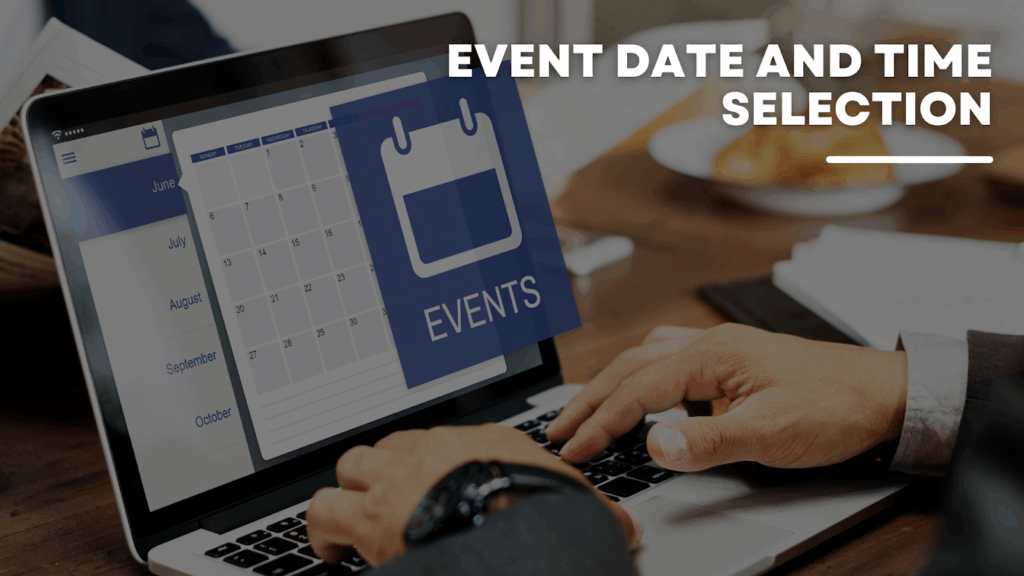
Selecting the right date and time is crucial to the success of an event. The timing influences attendance, logistics, and even the event’s overall atmosphere. Here are some of the most important factors to consider when setting your event’s schedule.
1. Audience availability
Your target audience’s availability should be the first factor in selecting the event date and time. For business events, weekdays, especially mid-week, are ideal. Social or family-oriented events tend to have more success on weekends when people have more free time.
2. Time of day
The time of day significantly affects the structure of your event:
Event Timing | Ideal For |
Morning | Focused, professional events such as workshops or training sessions |
Afternoon | Networking events, exhibitions, or product launches |
Evening | Social gatherings, dinners, or gala events where guests can relax |
3. Duration of the event
Timing also impacts how long the event will run. Shorter events are generally more engaging and easier for attendees to fit into their schedules. However, larger events (e.g., trade shows or festivals) might require longer durations.
Keep it concise: For smaller events, aim for 2-4 hours.
Longer events: Conferences or festivals can span the whole day or multiple days, with breaks and downtime built in to keep attendees refreshed.
4. Seasonal considerations
Seasonality impacts your event’s timing, with weather, holidays, and local events potentially competing for attention. Outdoor events should avoid peak rainy seasons or extreme weather, while major holidays should be avoided unless your event aligns with the holiday theme (e.g., Christmas parties or New Year’s Eve celebrations).
5. Avoiding conflicts with other major events
Be mindful of other major events in your area or industry that could affect attendance. Double-check for conflicts with major conferences, festivals, or local happenings that might draw attention away from your event.
Now that you’ve selected your event date and time, let’s explore how to bypass any conflicts with other major events
5. Creating an event timeline
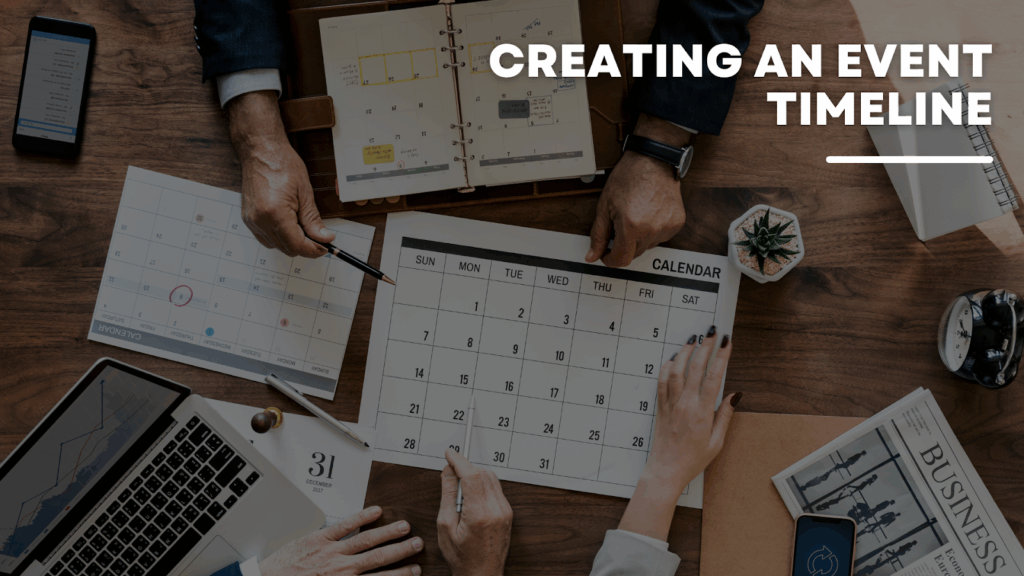
A well-crafted event timeline is a critical tool in the planning process. It’s a roadmap that guides you from concept to execution, ensuring everything happens at the right time and nothing is overlooked. Here’s how to set up a detailed timeline that helps streamline logistics, manage resources, and keep your team on track.
Step 1: Establish key milestones
To begin creating your event timeline, you first need to outline the major milestones of your event. These are the key dates and critical tasks that must be accomplished.
For example:
Timeline | Key Milestones |
6–12 months before the event | Book venue, hire speakers, finalize event theme |
3–6 months before the event | Open registration, confirm sponsors, secure vendors |
1–2 months before the event | Finalize schedule, confirm staff and volunteers, send participant reminders |
1 week before the event | Final logistics checks (materials, catering orders, badges) |
On the event day | Final setup, manage registration, oversee event flow, and provide guest services |
Each of these milestones will then break down into specific tasks, which you’ll track in your timeline.
Step 2: Create a day-of event schedule
Create a detailed day-of event schedule that outlines start and end times, key activity slots, and buffer periods for smooth transitions. Assign specific staff roles for check-ins, attendee support, and logistics to ensure the event runs seamlessly from start to finish.
Here’s an example of a simple event day timeline.
Time | Activity | Responsible Party |
8:00 AM | Event Registration Opens | Registration Team |
9:00 AM | Welcome and Opening Remarks | Event Host |
9:30 AM | Keynote Speech | Speaker, Tech Support |
10:30 AM | Coffee/Networking Break | Catering Team |
11:00 AM | Breakout Session 1 | Speaker, Event Manager |
12:00 PM | Lunch and Networking | Catering Team |
1:00 PM | Breakout Session 2 | Speaker, Event Manager |
2:30 PM | Afternoon Keynote | Speaker, Tech Support |
3:30 PM | Closing Remarks and Q&A | Event Host, Panellists |
4:00 PM | Event Close and Thank You | Event Coordinator |
Step 3: Use technology to optimise your timeline
Manual event planning, relying on spreadsheets, emails, and paper checklists often leads to inefficiencies. There’s an increased risk of human error, and makes it difficult to scale as events grow in complexity. Automating event management tasks with specialised software can reduce manual task time by up to 30%, freeing planners to focus on strategy and attendee experience instead of repetitive administrative work.
Wiz-Team, with its Event-Works platform, helps manage timelines by centralising event planning, automating task assignments, and offering real-time updates. This enables planners to track key milestones, ensure all tasks are completed on time, and make adjustments as needed.
Wiz-Team’s Event-Works platform served as the core Games Management System for the Birmingham 2022 Commonwealth Games, supporting one of the largest and most complex multi-sport events in the world. The platform was central to managing accreditation, access control, sport entries and qualifications, and the Baton Relay, ensuring seamless coordination across all operational areas.
Wiz-Team’s impact:
Supported over 130,000 registrations and produced 90,000 accreditations, optimising participant management at scale.
Enabled nearly 1 million entry point scans across 20 sports and 280 events, enhancing security and real-time tracking.
Deployed 465 partner portals, allowing efficient collaboration with stakeholders and partners.
Integrated real-time analytics with Tableau, enabling organisers to monitor operations and make data-driven decisions.
6. Promoting and marketing the event

Marketing is a vital part of your event’s success. It should be data-driven, aligned with key objectives and KPIs, and tailored to meet the needs of your target audience. Here’s how to approach it effectively:
Step 1: Marketing strategy
Your marketing strategy should be shaped by your attendees’ needs and the event’s goals. Use a mix of tools to reach your audience, including:
Event landing page: A clear, informative page where attendees can find all event details and register.
Social Media campaigns: Use platforms like Instagram, Facebook, and LinkedIn to build excitement and engagement.
Email campaigns: Leverage drip email campaigns to nurture leads and keep potential attendees informed as the event date approaches.
Step 2: Advertising channels
Choose the right channels to target your audience effectively. Based on your event type, focus on:
Event listing websites: Use platforms like Eventbrite or Meetup to increase visibility.
Social media: Ads and posts targeted at your specific audience, based on demographics and interests.
Local communities: Advertise in community centers, local groups, and through partnerships.
Print media: For local events, don’t overlook posters, flyers, and newspapers for targeted outreach.
7. Managing event registration
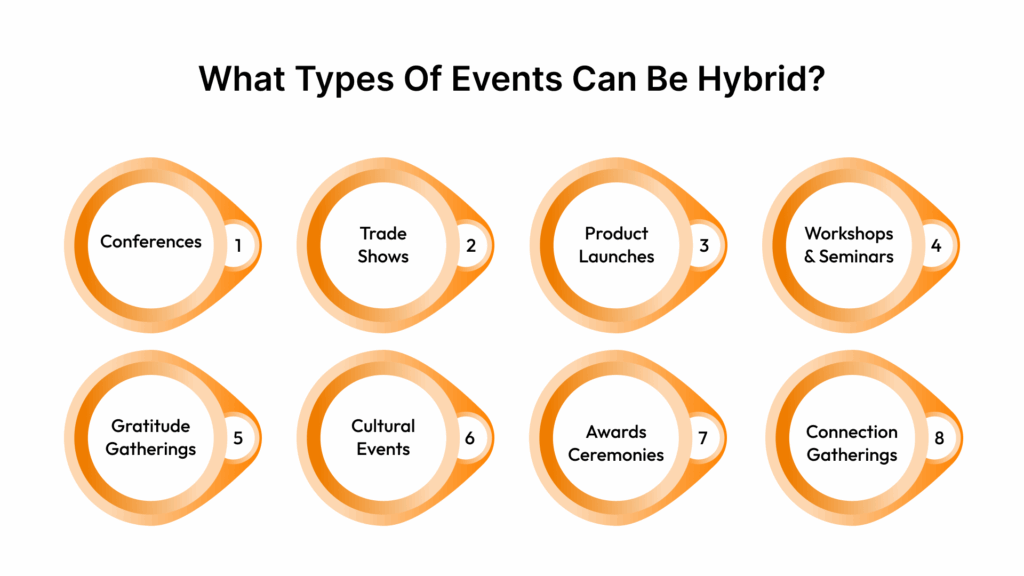
Efficient event registration is essential for a smooth attendee experience. Here’s how to manage it effectively:
1. Choose the right registration platform
Efficient event registration is crucial for delivering a seamless and professional experience to your attendees. With Wiz-Team’s Event-Works platform, you can simplify and optimise every aspect of the registration process.
For the EU Arctic Forum, Wiz-Team’s Event-Works platform delivered a streamlined registration experience for over 600 high-profile delegates from across Europe and the Arctic region. The platform enabled secure, user-friendly online registration, automated confirmation workflows, and real-time attendee management, all while meeting strict EU data privacy standards.
2. Set Clear Pricing and Ticket Types
Offer early-bird discounts, VIP tickets, or group pricing to encourage sign-ups. Clearly communicate the benefits of each ticket type.
3. Simplify the Registration Process
Keep registration simple and user-friendly by minimizing steps and making forms easy to complete. Ensure your platform is mobile-friendly, as many attendees will register from their phones. Send automatic confirmation emails and timely reminders to keep participants informed and help reduce no-shows.
4. Monitor Registration and Track Data
Regularly track registration numbers to assess progress and make necessary adjustments. This data can help with capacity planning, marketing strategies, and event logistics.
8. Securing speakers, entertainment, and vendors

A successful event depends on securing the right speakers, entertainment, and vendors. Here’s how to manage these crucial elements:
1. Securing speakers
Choose speakers that align with your event’s goals and appeal to your target audience.
Research and outreach: Identify potential speakers who are experts in the field or have experience with engaging audiences.
Contracts: Negotiate fees, travel, and accommodation details up front. Clearly outline expectations and any logistical requirements.
2. Securing entertainment
Entertainment can make or break the attendee experience, especially for social or corporate events. Choose entertainment that matches your event’s tone, whether it’s a live band, comedian, or DJ. Ensure you have the necessary equipment for sound, lighting, and staging, particularly for performances.
3. Securing vendors
Vendors are vital for delivering event services such as catering, decor, AV equipment, and more.
Vendor selection: Choose reliable vendors with a good track record. Always check reviews and get references.
Contracts: Have written agreements that outline deliverables, payment terms, and specific responsibilities to avoid confusion later.
9. Managing staffing and volunteers

A well-coordinated team of staff and volunteers ensures the event runs smoothly from start to finish. Here’s how to manage them effectively:
1. Define roles and responsibilities
Clearly outline roles and responsibilities for all team members before the event. Assign staff to key areas like logistics, registration, or technical support, while volunteers can take on flexible tasks such as attendee assistance, setup, or managing activities. This clarity ensures everyone knows their duties and helps the event run smoothly.
2. Recruitment and training
Recruit enthusiastic and capable team members, then provide training sessions to familiarise them with the event schedule, venue, and their specific duties. Clear instructions and contact information ensure everyone knows their responsibilities and where to turn for help, keeping operations smooth on event day.
3. Schedules and flexibility
Maintain clear, flexible schedules for staff and volunteers, regularly check their progress, and quickly reassign tasks if priorities shift or gaps arise. This ensures smooth coordination, even when last-minute changes occur
With Wiz-Team’s Event-Works platform, you can manage your workforce with ease, streamline communication, and optimise operations. Event-Works allows you to define and assign roles to staff and volunteers clearly. With customisable task assignments, you can ensure that your team members are prepared for their specific duties.
10. Post-event evaluation and follow-up

You did it! The event is over, and it’s time to breathe. But before you kick back and relax too much, it’s time for the post-event evaluation, where you reflect on what went well, what could be better, and how you can make your next event even more successful.
Check in with your metrics
Did you hit your goals? Look at the KPIs you set for the event. Did you meet or exceed your expectations on things like attendance, ticket sales, or engagement?
What worked and what didn’t? Were there any surprises, good or bad?
Get Feedback from Attendees
Send out a quick post-event survey. Ask attendees what they liked, what could be improved, and if they’d come back next time.
Pay attention to patterns in responses: recurring comments can point to areas that need work.
Review Data
Registration numbers: Did your event attract the number of attendees you planned for?
Social media engagement: How did your hashtags perform? Were attendees sharing their experience?
Financial results: Did you hit your revenue or fundraising targets?
Talk to your Team
Check in with your volunteers and staff. How did they feel about the event? Any challenges or wins they’d like to share?
A quick team debrief is valuable for understanding what went well behind the scenes.
Reflect on key questions
Did we meet our forecast? Whether it’s about budget, attendance, or goals, it’s important to see how close you were to your predictions. If not, figure out what can be improved.
What was the feedback from attendees? Not just individual comments, but trends. If several people mentioned the same thing (positive or negative), take note.
How did the team perform? Think about the performance of your staff and volunteers. what roles worked well, and what could be changed for next time?
How did marketing perform? Which channels brought in the most attendees or engagement? Was it social media, email, or local press? Focus on what gives you the best ROI.
With your event’s success measured and insights in hand, it’s time to see how Wiz-Team can help you build on those results and make your next event even more impactful.
How Wiz-Team enhances your event planning process
Wiz-Team’s Event-Works platform offers a comprehensive, all-in-one solution designed to optimise every phase of event management. By combining powerful features with a user-centric design, Event-Works simplifies complex processes, enabling event organisers to focus on delivering exceptional experiences.
The transition to Event-Works is structured to ensure a smooth and efficient implementation. The process includes:
Discovery: A detailed assessment of your event’s needs through consultations and workshops to ensure a tailored solution.
Configuration: Customising Event-Works to align with your event’s requirements, followed by rigorous testing to guarantee seamless functionality.
Training: Hands-on workshops and tutorials to equip your team with the necessary skills for effective platform usage.
Ongoing Support: Continuous assistance, both remotely and on-site, ensuring your event runs smoothly from start to finish.
Proven success accross industries
Event-Works has been successfully implemented across a wide range of industries, including:
Wiz-Team provided the Special Olympics World Games 2023 in Berlin with accommodations management solution. Their system efficiently managed the distribution of nearly 84,000 rooms across 42 locations, supporting over 15,000 participants, including 7,000 athletes from 190 countries. The platform’s room block management, allocation features, and front-end partner portal empowered 185 delegations to independently manage their rooming lists, significantly reducing the organisers’ workload.
Wiz-Team partnered with Fielddrive to implement a fully automated visitor management system at the European Commission’s Visitors center. The solution integrates Wiz-Team’s Event-Works software with high-speed printers and ID/passport readers, enabling seamless self-check-in via ten kiosks. In 2022, these kiosks processed over 500,000 visitors, enhancing data accuracy and security while reducing manual entry errors.
Wiz-Team has secured a three-year partnership with the World Council of Churches (WCC), continuing to support its digital transformation with the Event-Works platform. This platform manages a wide range of events, from regional meetings to large international summits, handling registrations, accreditation, access control, and guest communication. Wiz-Team will also provide a custom mobile app for event delegates, offering secure access and networking features.
With its proven track record, Event-Works has demonstrated its adaptability and scalability across diverse event types, making it a reliable choice for any organisation looking to streamline event planning and execution.
Also Read: Qualifying and quantifying the power of configuration
Conclusion
Event planning is a complex, multi-step process, but with the right tools and strategies, it can be smooth and efficient. By focusing on the essentials: clear goals, streamlined logistics, and attendee experience, you can create an event that leaves a lasting impression. For seamless execution, Wiz-Team’s Event-Works platform offers scalable, customizable solutions to fit your unique event needs, whether small or large. Contact Us today.
#WizJourney

